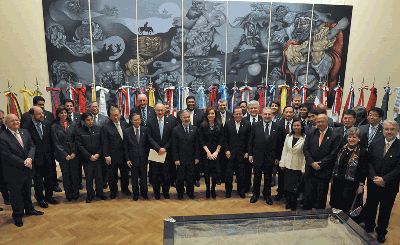FEALAC Countries Explore Options for Improving Cooperation, Trade and Investment in This New Era
Work area(s)
Alicia Bárcena took part in the Forum for East Asia-Latin America Cooperation held in Buenos Aires.

(25 August 2011) Today, the Executive Secretary of ECLAC, Alicia Bárcena stated that developing countries in Asia and Latin America and the Caribbean must act proactively in the present world economic scenario and take advantage of the opportunities which growing exchange and South-South cooperation offer.
Member countries of the Forum for East Asia-Latin America Cooperation represent 36% of global GDP, and 32% of exports and 28% of imports at global level. They are also important holders of United States Treasury bonds (almost 60%).
The senior representative of the United Nations gave a presentation at the fifth Ministerial Meeting of the Forum for East Asia-Latin America Cooperation (FEALAC), held in Buenos Aires, Argentina, during which she highlighted the strength of emerging nations in the southern hemisphere following the international crisis.
"South-South trade is an important driving force of international trade activity and it represents 23% of world exports. In addition, the countries of emerging Asia and Latin America and the Caribbean concentrate 41% of global flows of direct foreign investment," she stated.
Ms. Bárcena stressed that "For this reason, it is very important that FEALAC member countries reposition themselves in the world economy to address the growing relevance of South-South linkages in areas such as trade, foreign investment and finance, by enhancing cooperation in innovation and human capital."
"This could create more stable conditions for growth," she said.
During the meeting, the Executive Secretary of ECLAC released the document Forum for East Asia-Latin America Cooperation (FEALAC). New bi-regional trade and investment relations in a changing world economic environment, which was requested by the Government of Argentina and prepared especially for the fifth Ministerial Meeting of FEALAC.
This publication indicates that strengthening economic and trade relations between the two regions would by very useful for developing linkages between innovation and competitiveness in the Latin American region, between trade and investment, and productivity and technology.
"The quality of international economic integration of Latin America and the Caribbean over the next decades, and the region's development perspectives, will depend primarily on the economic links and cooperation which it creates with Asia-Pacific," stated Ms. Bárcena. "For this reason, ECLAC has been supporting, for a number of years, different reconciliation initiatives put forward by both of the regions," she added.
Several countries in Latin America and the Caribbean have benefited from growing trade flows with Asia-Pacific, including Argentina, Brazil, Chile, Costa Rica and Peru. However, this trade is mainly of an inter-industry nature, in which the region exports primary products and natural resource-based manufactures and imports manufactures of different technological intensities.
"For this reason, we must promote trade at intra-industry level with emphasis on export diversification, and promote investment flows centred on value chains involving both Asian and Latin American firms," stated Alicia Bárcena.
See:
Any queries should be addressed to the ECLAC Public Information and Web Services Section. E-mail: dpisantiago@cepal.org; Telephone: (56 2) 210 2040.
Follow us on: Twitter, Facebook, Flickr and YouTube.
Related content
Forum for East Asia-Latin America Cooperation (FEALAC). New bi-regional trade and investment relations in a changing world economic environment
Presentación de Alicia Bárcena, Secretaria Ejecutiva de la CEPAL, en la V Reunión de Ministros de Relaciones Exteriores del Foro de Cooperación América Latina-Asia del Este (FOCALAE-FEALAC). Buenos…
Country(ies)
- Latin America
- Asia
Contact
Public Information Unit
- prensa@cepal.org
- (56 2) 2210 2040